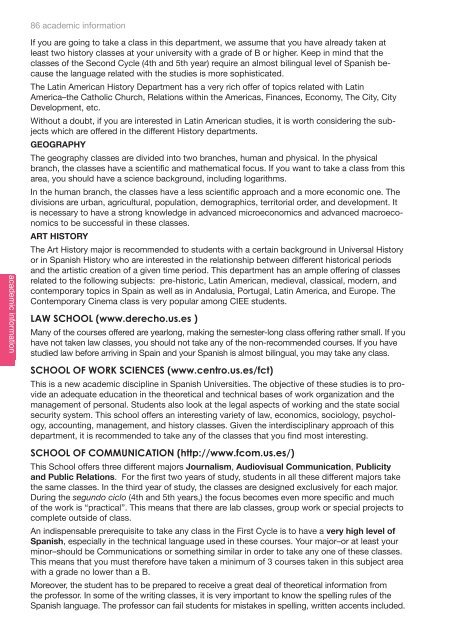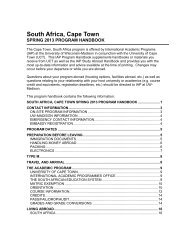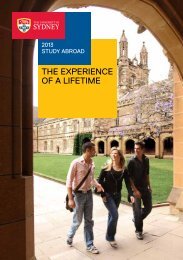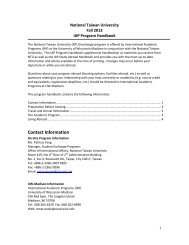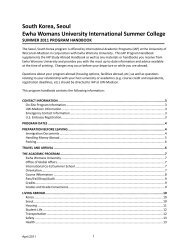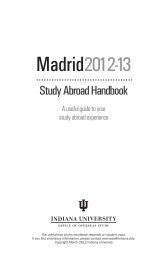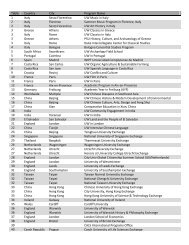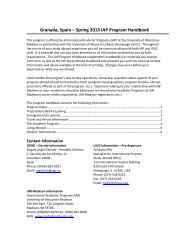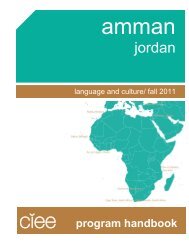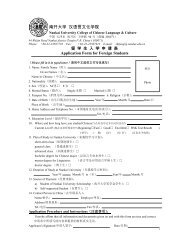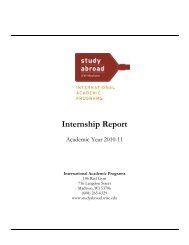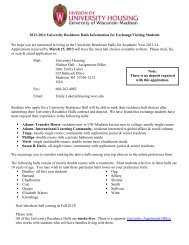teach in spain - UW Study Abroad
teach in spain - UW Study Abroad
teach in spain - UW Study Abroad
Create successful ePaper yourself
Turn your PDF publications into a flip-book with our unique Google optimized e-Paper software.
86 academic <strong>in</strong>formation<br />
academic <strong>in</strong>formation<br />
If you are go<strong>in</strong>g to take a class <strong>in</strong> this department, we assume that you have already taken at<br />
least two history classes at your university with a grade of B or higher. Keep <strong>in</strong> m<strong>in</strong>d that the<br />
classes of the Second Cycle (4th and 5th year) require an almost bil<strong>in</strong>gual level of Spanish because<br />
the language related with the studies is more sophisticated.<br />
The Lat<strong>in</strong> American History Department has a very rich offer of topics related with Lat<strong>in</strong><br />
America–the Catholic Church, Relations with<strong>in</strong> the Americas, F<strong>in</strong>ances, Economy, The City, City<br />
Development, etc.<br />
Without a doubt, if you are <strong>in</strong>terested <strong>in</strong> Lat<strong>in</strong> American studies, it is worth consider<strong>in</strong>g the subjects<br />
which are offered <strong>in</strong> the different History departments.<br />
GEOGRAPHY<br />
The geography classes are divided <strong>in</strong>to two branches, human and physical. In the physical<br />
branch, the classes have a scientific and mathematical focus. If you want to take a class from this<br />
area, you should have a science background, <strong>in</strong>clud<strong>in</strong>g logarithms.<br />
In the human branch, the classes have a less scientific approach and a more economic one. The<br />
divisions are urban, agricultural, population, demographics, territorial order, and development. It<br />
is necessary to have a strong knowledge <strong>in</strong> advanced microeconomics and advanced macroeconomics<br />
to be successful <strong>in</strong> these classes.<br />
ART HISTORY<br />
The Art History major is recommended to students with a certa<strong>in</strong> background <strong>in</strong> Universal History<br />
or <strong>in</strong> Spanish History who are <strong>in</strong>terested <strong>in</strong> the relationship between different historical periods<br />
and the artistic creation of a given time period. This department has an ample offer<strong>in</strong>g of classes<br />
related to the follow<strong>in</strong>g subjects: pre-historic, Lat<strong>in</strong> American, medieval, classical, modern, and<br />
contemporary topics <strong>in</strong> Spa<strong>in</strong> as well as <strong>in</strong> Andalusia, Portugal, Lat<strong>in</strong> America, and Europe. The<br />
Contemporary C<strong>in</strong>ema class is very popular among CIEE students.<br />
LAW SCHOOL (www.derecho.us.es )<br />
Many of the courses offered are yearlong, mak<strong>in</strong>g the semester-long class offer<strong>in</strong>g rather small. If you<br />
have not taken law classes, you should not take any of the non-recommended courses. If you have<br />
studied law before arriv<strong>in</strong>g <strong>in</strong> Spa<strong>in</strong> and your Spanish is almost bil<strong>in</strong>gual, you may take any class.<br />
SCHOOL OF WORK SCIENCES (www.centro.us.es/fct)<br />
This is a new academic discipl<strong>in</strong>e <strong>in</strong> Spanish Universities. The objective of these studies is to provide<br />
an adequate education <strong>in</strong> the theoretical and technical bases of work organization and the<br />
management of personal. Students also look at the legal aspects of work<strong>in</strong>g and the state social<br />
security system. This school offers an <strong>in</strong>terest<strong>in</strong>g variety of law, economics, sociology, psychology,<br />
account<strong>in</strong>g, management, and history classes. Given the <strong>in</strong>terdiscipl<strong>in</strong>ary approach of this<br />
department, it is recommended to take any of the classes that you f<strong>in</strong>d most <strong>in</strong>terest<strong>in</strong>g.<br />
SCHOOL OF COMMUNICATION (http://www.fcom.us.es/)<br />
This School offers three different majors Journalism, Audiovisual Communication, Publicity<br />
and Public Relations. For the first two years of study, students <strong>in</strong> all these different majors take<br />
the same classes. In the third year of study, the classes are designed exclusively for each major.<br />
Dur<strong>in</strong>g the segundo ciclo (4th and 5th years,) the focus becomes even more specific and much<br />
of the work is “practical”. This means that there are lab classes, group work or special projects to<br />
complete outside of class.<br />
An <strong>in</strong>dispensable prerequisite to take any class <strong>in</strong> the First Cycle is to have a very high level of<br />
Spanish, especially <strong>in</strong> the technical language used <strong>in</strong> these courses. Your major–or at least your<br />
m<strong>in</strong>or–should be Communications or someth<strong>in</strong>g similar <strong>in</strong> order to take any one of these classes.<br />
This means that you must therefore have taken a m<strong>in</strong>imum of 3 courses taken <strong>in</strong> this subject area<br />
with a grade no lower than a B.<br />
Moreover, the student has to be prepared to receive a great deal of theoretical <strong>in</strong>formation from<br />
the professor. In some of the writ<strong>in</strong>g classes, it is very important to know the spell<strong>in</strong>g rules of the<br />
Spanish language. The professor can fail students for mistakes <strong>in</strong> spell<strong>in</strong>g, written accents <strong>in</strong>cluded.


